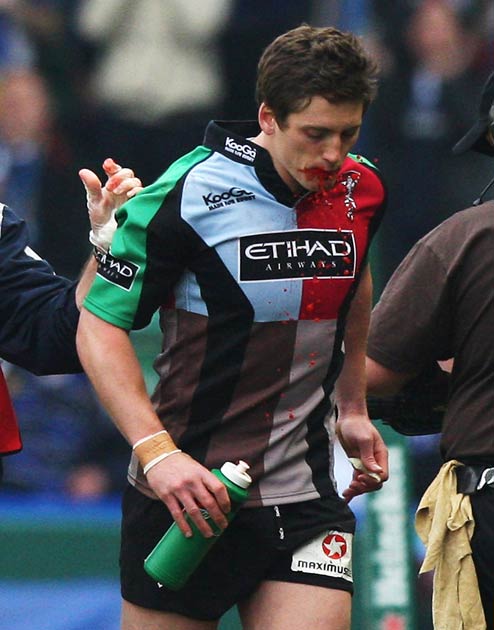RFU chief rocked by 'Bloodgate'

The Rugby Football Union's disciplinary chief Judge Jeff Blackett last night revealed the Bloodgate scandal at Harlequins shook his faith in the game more than any other incident.
Delivering the annual Sunday Times Obolensky Lecture, Blackett provided an insightful and occasionally hard-hitting analysis of the issues which most severely threaten the core values of a sport which prides itself on being hard but fair.
Blackett's address on the rugby's wobbling moral compass covered the England sex scandal in New Zealand in 2008, the Bath drugs affair and the Schalk Burger eye-gouging incident during the Lions tour.
But it was the Bloodgate scandal which affected him most, particularly the subsequent cover-up attempt which was orchestrated by Harlequins' then director of rugby Dean Richards.
Blackett said: "What was more serious than the cheating on the pitch was the subsequent events - a doctor allegedly cutting a player in the mouth to camouflage the original deception; the willingness of a number of respected people to lie to a disciplinary panel.
"Of all the misdeeds of the past 12 months, this above all shook me. Rugby folk have always been pretty honest. They have fronted up to their misdeeds and took their medicine.
"But this I think is a worrying development, that people are prepared to cheat and lie. Most shocking of all for me was the part played by Dean Richards.
"He was the essence of English rugby when he played and a highly successful coach. He was someone I trusted when he represented his players at many disciplinary hearings.
"But something persuaded him to lie and if a man like that can succumb to those pressures, where does that leave rugby football?"
Blackett fears the pursuit of victory at all costs has also led to an increase in incidences of eye-gouging.
Blackett accused the game's judicial colleagues of lacking the stomach to crack down hard on what an offence the International Rugby Board described earlier this year as "heinous".
Burger only received an eight-week ban for his attack on Lions winger Luke Fitzgerald, a punishment described by Blackett as "unduly leniant".
He added: "Unfortunately there has been an inconsistency of approach in dealing with this sort of offence, which players themselves perceive as pretty serious.
"I have observed that all players are much more willing to run their hands over opposition faces and around the eye to gain any small advantage when the margins are so small.
"Let's never pretend winning isn't important, clearly it is, but it shouldn't be all important."
The Bath drugs scandal began when England prop Matt Stevens failed an in-competition test for cocaine and received a two-year suspension from all rugby.
Blackett disagrees with the WADA Code for recreational drugs, which brackets them the same as performance enhancing and sparks an immediate suspension.
"I believe in second chances and rehabilitation," said Blackett, who has helped introduced an illicit drugs programme into the Guinness Premireship.
Blackett reported that many players within the game - he quoted the example of Martin Corry - want a zero tolerance policy on the use of recreational drugs within the game.
Blackett also attacked the topical issue of injuries within the game and pointed the finger in a new direction - at rugby's administrators and referees.
England are currently without over a third of their initial autumn international squad, which has been attributed in some quarters to players becoming "gym monkeys" and being forced to play too many matches.
But Blackett believes the officials - referees and citing officers - are at fault for not applying the laws of the game strictly and allowing players to tackle or hit rucks illegally.
"Much has been written about bulky players, big hits, violence in the game and too many matches," said Blackett.
"We are not applying the laws of the game or we are interpreting them too freely.
"If referees and citing officers applied the rules more rigidly we may see a reduction of injuries at the breakdown. There is a balance between dynamism and safety and I think it has gone too far in the wrong direction.
"In an effort to increase the attractiveness of the competition we are in danger of damaging the game."
The International Rugby Board is considering issues such as they at their medical conference later this month.
Although Blackett admitted England had been hit hard by the summer scandals he is convinced they are isolated incidents and not the tip of the iceberg.
He said: "It would be impossible to deny that we were challenged during the summer. To borrow from Mark Twain, rumours of rugby's demise have been greatly exaggerated.
"If there were fundamental concerns over those issues then the International Olympic Committee would not have voted rugby into the 2016 Games.
"I think the future looks bright and that overall is why I am certain that rugby's moral compass is in good working order."
Join our commenting forum
Join thought-provoking conversations, follow other Independent readers and see their replies
Comments
Bookmark popover
Removed from bookmarks